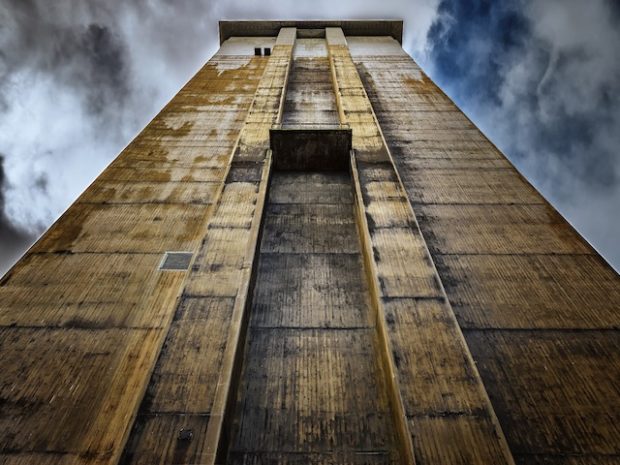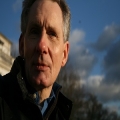You have no items in your cart. Want to get some nice things?
Go shopping
The bricks are far below, baking in the sun, but here the vaporous wisps of cumulus dampen his jerkin, trowel, snap. The derricks are still, ropes twisting in the breeze, and it’s quiet: creak of tortured wood ceased as the men climb out of the treadwheels; the cranes silent, the silence quickening for the midday hour. He settles to enjoy it.
The breeze has cleared the cumulus; there’s a blessing of sun despite the height. He scratches his back against the buttress, spreads his legs, unslings his basket. From the laddered scaffold above him comes a raucous grus grus then silence again.
Below on the work huts on the spiral terrace the thatch is already decaying and far below, on the plain, the town stretches in stillness. He breaks open the loaf, tears out some crumb, dips the crust in water and chews slowly, meditatively, regretting afresh his marrying unwisely – was bread harder than brick a fair price for affection? – but the lengthened mastication is in tune with his mood. For day by day he has seen the population of the town drop as whole groups departed, signs of habitation shrinking like puddles in the sun. Up here on the ramps it is felt even more, a dismal let-down after the excitement, the hubbub: that strange, strained period of sudden alterity, the uncanniness of human encounter made problematic.
No more lingual music decoupled from meaning; no daily, hourly, impromptu mime, spontaneous signal eloquence, no more flare of temper then enkindled warmth of empathetic reach; no more the quickened sense of selfhood.
All gone. All quiet. A far distant grus grus then silence. He chews on, chews over his sense of estrangement, his speech now unconfident, self-conscious, swollen crumb to his tongue, hard crust between his teeth.
Life is now in the present tense.
For it is now clear the building will go on for years, forever – job security for the rest of his life. It’s equally clear they will never reach the heavens, never burst through the mundane dimension into dazzled wonder; the great project has lost its meaning, become a self-perpetuating myth, a self-justifying occupation of build-and-repair; life drained of optimism, the tower merely the plain upended.
He tosses the heel over the terrace, watches it fall, thinks that now his fecklessness is curbed if not cured, he can confront his wife, complain with justness, put his foot down over her baking, he being now a reliable breadwinner. There is a bright side to things despite the grey.
Grus grus. He looks up, sees the crane, watches it slowly flap its wings, take off, beating toward the low horizon.
*
That was a way of putting it: an ekphrastic study in a worn-out fictional idiom.
For what does it amount to, this Bruegelian imbroglio?
The forms have died along with the myth, leaving the worker stranded on the crumbling tower on the plains of Shinar, and us begging for bread. For us, the intolerable wrestle with words is playacting, a fixed bout with choreographed moves, to rules we no longer believe in. Who today tastes language on the tongue, between the teeth? Rather, a drouth, an after-taste of eructation.
The towering myth of Babel was quarried over centuries, from Augustine to Alfred the Great – in, that is to say, a prelapsarian age. We now know better: the Pentecostal flames were merely spontaneous combustion, the irruption of languages a series of lightning strikes yet to be explained.
In the mid-nineteenth century, the German philologist Karl Gustav Weigel, reviving a monogeneticist tradition, devised an elaborate graph plotting co-ordinates of lexical/etymological against syntactical/phonetic affinities to measure the radii of displacement, mapping the vectors and zones of banishment from the ur-sprache.
His venture was historically late – too late; he was duly pilloried. His life ended in silence: no word was uttered, went the legend, for the thirty years preceding his death. Some maintained it was the silence of shame. But there were counter-rumours: (i) that he believed he had identified the ur-sprache as being not German, as had been believed since the sixteenth century, that he learnt and spoke only Akkadian; (ii) that he felt himself to be on the linguistic edge of the Western world, too many zones from Shinar, and took the sense of exile personally.
But maybe it was darker still; that his silence foreshadowed die sprachkrise, la crise du langage – that crepuscular suspicion, the owl-born intimation that not division but language itself was the civilizational curse; that language – at least, literacy – would no longer be the Leavisian creative flux but carrion burden; that henceforth the invocation of cranes would be not taxonomic play but rhetorical taxidermy, aleatory impasse, gruesome noise.
On the plains of Shinar we sat down and wept.
We requested bread, we received sucking-stones; the permutations – pocket-mouth-pocket – amused us awhile. But now we have to face up to the choices: thin gruel?; stale wafer?; the unLeavened crust lodged between our teeth, dry crumb beneath our tongue?
Oh, swallow, swallow.

About David Rose
David Rose was born in 1949. After attending a local Grammar, he spent his working life in the Post Office. His debut story was published in the Literary Review in 1989, since when he has appeared in a wide variety of magazines and anthologies, including Best British Short Stories (Salt). He was for some years co-owner and Fiction Editor of Main Street Journal. His first novel, Vault, was published in 2011, followed by a story collection, Posthumous Stories, in 2013 (both Salt). His second novel, Meridian, appeared in 2015 from Unthank Books. In 2018, a story from Posthumous Stories - "A Nice Bucket" - was selected for The Penguin Book of the Contemporary British Short Story (ed. Hensher). In November 2022, a collection of eight stories - with photographic artwork by Leah Leaf - Interpolated Stories - appeared from Confingo Publishing. He lives just outside West London, between Richmond and Windsor.




